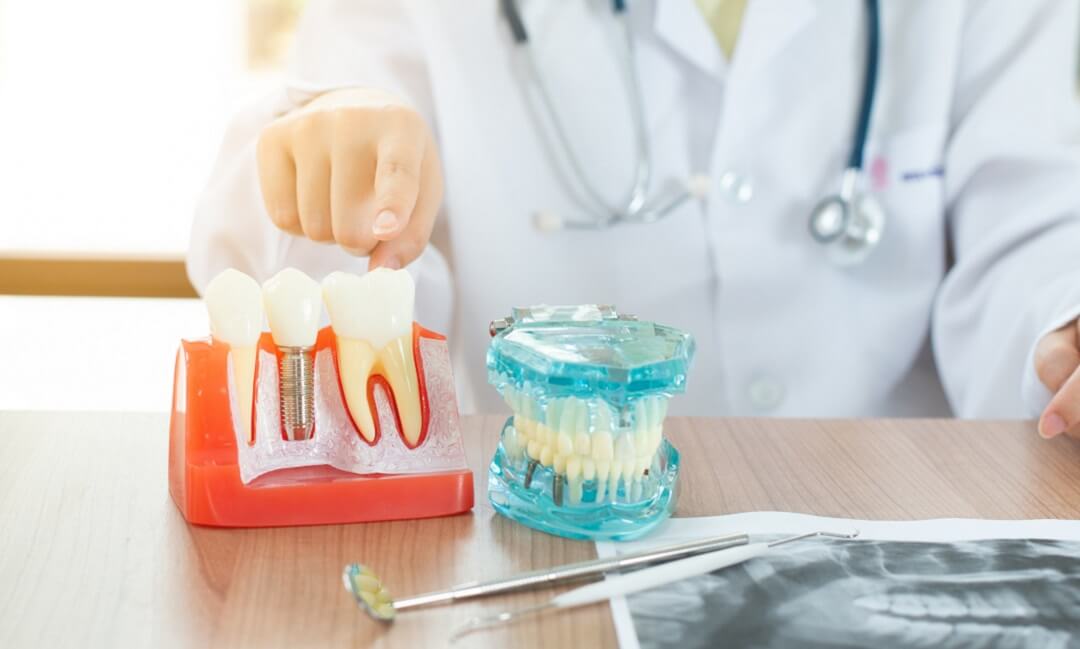Dental implants provide a life-changing solution for missing teeth, enabling you to smile confidently and eat the foods you love. It represents a significant advancement in dental technology, offering a durable and aesthetically pleasing solution for missing teeth.
But to make the most of this investment, thorough dental implant care and maintenance are non-negotiable. Taking care of your dental implants after surgery is key to a long-lasting, beautiful smile.
When you get dental implants, you’re making a big step towards restoring your smile and confidence. But what comes next is just as important as the surgery itself: taking good care of your implants.
In this guide, we’ll show you exactly how to keep your dental implants in top shape, covering everything from the first few days after surgery to your daily care routine and what foods are best for your new smile.
Key Takeaways
- Expect bleeding, use gauze and avoid dislodging blood clots.
- Swelling is normal, use ice packs for 24 hours then switch to moist heat.
- Take prescribed antibiotics as directed to reduce infection risk.
- Stick to soft foods and avoid hard or chewy foods, hot liquids, and straws.
- Rest for 24 hours, avoid strenuous activities, and do not smoke. Practice good oral hygiene with saltwater rinses and gentle brushing.
Immediate Implant Care After Oral Surgery
Following the oral surgery, it’s common to experience some level of discomfort, swelling, and light bleeding around the implant site. These are normal signs that your body is healing.
Typically, the most pronounced symptoms occur within the first 24 to 48 hours and gradually subside over the following days. It’s important to keep an eye on these symptoms, as excessive bleeding, severe pain, or signs of infection may require immediate attention from your dental professional.
Bleeding
After oral surgery, bleeding is normal and expected. Your surgeon will place gauze over the implant site and ask you to gently bite down on the area. Keep this gauze in place for at least an hour, replacing the gauze, as necessary. Bleeding should stop within four to six hours, but do not be surprised if you continue to see blood in your saliva. As your saliva passes over a blood clot, it can appear red and make it look like you are still bleeding. To help reduce and minimize bleeding, sit upright and sleep with your head elevated for the first 24 hours after your procedure. Avoid the implant area with your tongue as this can dislodge a clot. If persistent bleeding continues, call your dentist for additional instructions.
Swelling
You may notice swelling in your face the day after your dental implant surgery. This is normal and is likely to increase, with peak swelling often occurring two to three days after your procedure. You can help to reduce swelling with the application of ice packs for the first 24 hours. Apply ice packs wrapped in a towel to your face for 20 minutes on and 20 minutes off to help manage the swelling. After the first 24 hours, switch to moist heat to reduce swelling. A heating pad or a warm moist towel applied to the face will help.
Pain and discomfort
You may experience mild discomfort after your implant surgery and for the first day or two during recovery. For most people, over-the-counter pain medications are enough to control any discomfort, though you may also receive prescription pain medications. Take any pain medications as directed. You should see your discomfort decrease each day. However, if you experience increased pain or discomfort, contact your dentist immediately.
Antibiotics
In some cases, your dental surgeon may prescribe antibiotics after your dental implant procedure. You must take these antibiotics as directed and complete the entire course. This helps to reduce your risk of infections and implant failure.
Diet
After dental implant surgery, what you eat and drink is an important part of your recovery. While eating may seem difficult, it is important for your recovery to continue taking in calories and staying hydrated. However, you must also use caution. First, do not eat anything until the anesthetic wears off. For the first 24 hours, choose soft foods, such as yogurt, pasta, scrambled eggs, pancakes, mashed potatoes, or applesauce. When chewing, avoid your surgical site. Be sure to drink plenty of fluids throughout the day.
It is best to avoid foods that are hard or require a lot of chewing. Foods such as popcorn, seeds, or potato chips should be avoided for at least a week. Avoid hot liquids for the first day. Do not use a straw for drinking as the suction required can dislodge a clot.
Maintaining Oral Hygiene After Implant Surgery
Maintaining optimal oral hygiene after dental implant surgery is paramount for ensuring the health and longevity of your implant. As you embark on the recovery journey, it’s essential to adopt a meticulous oral care routine that supports healing and prevents infection. This section will delve into the best practices for keeping your dental implant and surrounding tissues clean and healthy.
1. Cleaning Your Dental Implants
Starting 24 hours after your surgery, you should gently rinse your mouth with warm salt water 2-3 times a day, especially after meals, to help soothe the implant site and reduce the risk of infection. When it comes to brushing, proceed with caution. Use a soft-bristled toothbrush and avoid direct contact with the surgical site for the first few days. As healing progresses, you can begin to carefully clean around the implant, still using a soft brush to gently remove any plaque buildup without irritating the area.
2. Flossing and Using Interdental Brushes
Flossing is a critical component of implant care, but it must be done with care. Initially, avoid flossing the area directly around the implant to prevent disturbing the healing tissues. After a few weeks, once your dentist gives the go-ahead, you can start using unwaxed tape or implant-specific floss to clean around the implant and under the gum line. Interdental brushes are also excellent for cleaning hard-to-reach areas around the implant, but ensure the brush size is appropriate to avoid causing any damage.
3. Oral Irrigators
Oral irrigators, or water flossers, can be a valuable addition to your oral hygiene routine, offering a gentle way to clean around implants. Set the device to a low-pressure setting to avoid any forceful impact on the healing implant site. Water flossers can help remove debris and plaque, complementing traditional brushing and flossing techniques.
4. Avoiding Harmful Habits
Certain habits can jeopardize the health of your dental implant, including smoking and using tobacco products, which can impair healing and increase the risk of implant failure. Similarly, avoid using toothpicks or other sharp objects around the implant, as they can damage the soft tissues and lead to infection.
By following these oral hygiene practices, you will not only support the healing of your dental implant but also contribute to the overall health of your mouth. Remember, the success of your implant depends significantly on how well you care for it and the surrounding tissues. Regular check-ups with your dentist are also crucial for monitoring the implant’s condition and addressing any issues promptly.
Further Reading: How to Care for My Dental Implants
Frequently Asked Questions
To help you on your journey, we’ve compiled a list of frequently asked questions that address common concerns and provide additional insights into the care of your dental implant.
Can I brush my teeth normally after implant surgery?
It’s important to maintain oral hygiene after surgery, but you should do so with caution initially. Use a soft-bristled toothbrush and avoid brushing the surgical site directly for the first few days. As the area begins to heal, you can gently clean around the implant. Always follow your dentist’s specific recommendations for brushing post-surgery.
How long after the surgery can I eat normally?
Your ability to return to a normal diet depends on the complexity of your surgery and how quickly you heal. It’s generally advised to stick to soft foods for at least the first week after surgery to avoid putting undue pressure on your implant. Gradually reintroduce harder foods as you feel comfortable and as recommended by your dental professional.
What are the signs of infection I should watch for?
Signs of infection include persistent or worsening pain, redness, swelling, a fever, or pus coming from the implant site. If you notice any of these symptoms, contact your dentist immediately for evaluation and possible treatment.
How soon can I return to work after implant surgery?
Many people can return to work within 1-2 days after surgery, depending on the nature of their job and how they feel. However, if your job involves heavy physical labor, you may need to take more time off. Listen to your body, and don’t rush your recovery.
How often should I visit my dentist after getting an implant?
Regular follow-up visits are crucial for ensuring the health of your implant and the surrounding tissue. Typically, your dentist will want to see you a few times in the first year after surgery to monitor your progress and then annually or as recommended based on your individual needs.
Wrapping It Up: Your Smile’s Bright Future
Navigating the post-surgery care of dental implants teaches us that a bright, confident smile requires both knowledge and dedication. From handling the initial recovery to keeping up with oral hygiene and dentist visits, each action contributes significantly to the longevity of your implants.
Dental implants do more than improve appearances; they enhance your quality of life. By adopting straightforward care practices, you’re not just safeguarding your investment; you’re embracing a future filled with confidence and joy.
Ready for a Lifetime of Smiles?
At Soundview Family Dental, we’re here to ensure your dental implant journey is smooth, from the moment you consider surgery to the lifelong care that follows. If you’re looking for expert guidance on achieving and maintaining a radiant smile with dental implants, we’ve got you covered. Our team is dedicated to providing personalized care tailored to your unique needs, ensuring your dental health and confidence remain at their peak.
Ready to take the next step toward a brighter, more confident smile?
Contact us online or call us at (425) 563-6360 to schedule your appointment and discover how we can help you enjoy the benefits of dental implants for years to come.


